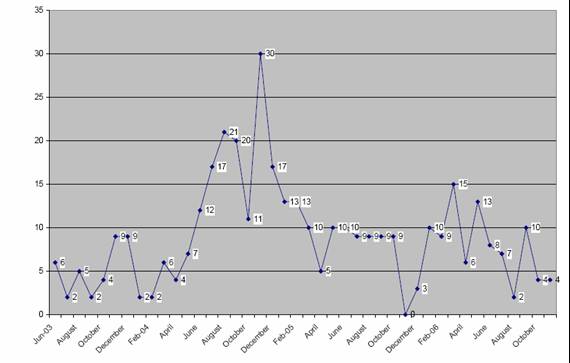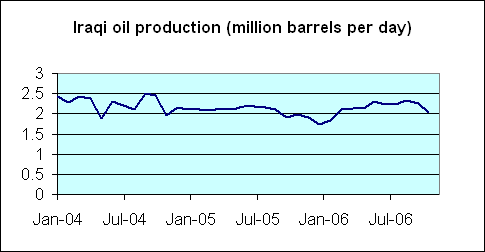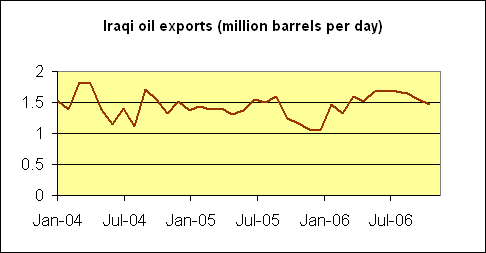Dave Schuler and his Glittering Eye have called for a cross-blog discussion on options and prospects for Iraq. I’m glad to contribute with some thoughts on the economic situation, and invite you to participate as well, with comments left here or at any of the other participating sites.
With the military and political challenges in Iraq so daunting, it may seem odd to be discussing economic strategy at this point. However, I believe a case can be made that without a system to generate jobs and incomes, and in particular to guarantee the economic welfare of the Sunnis, even the best military strategies or wisest political solutions would have a very hard time succeeding.
Although many of the geopolitical and military recommendations in the report from the Iraq Study Group have generated a good deal of controversy, in my opinion the ISG produced some excellent analysis of the economic concerns. First, the ISG is of course correct that “the oil sector is critical to the success of the Iraqi economy.” I would draw the analogy to first aid for someone with multiple life-threatening injuries. The first thing you have to do is stop the bleeding, because if you can’t succeed at that, nothing else will matter. Petroleum is the lifeblood of the Iraqi economy.
One would therefore presume that one of the most important military objectives in Iraq would be to maintain petroleum production and exports. The raw data compiled by the Brookings Institution Iraq Index support the view that such efforts have been reasonably successful. Attacks on Iraqi oil infrastructure have been kept down,
 |
and up until the last two months, production and exports have held up:
 |
 |
Where clearly a better job needs to be done is in making sure that these oil flows work immediately and obviously to the benefit of ordinary Iraqis. Starting small, one of the real gems from the ISG report is buried within a bullet point of their Recommendation 62:
The U.S. military should work with Iraqi military and with private security forces to protect oil infrastructure and contractors. Protective measures could include a program to improve pipeline security by paying local tribes solely on the basis of throughput (rather than fixed amounts).
This strikes me as an incredibly good idea, not just from the perspective that it’s a more efficacious way to reduce infrastructure attacks, corruption, and theft, but also because it works immediately toward the very important objective of letting Iraqis personally and directly receive benefits and develop a stake in economic reconstruction. If you pay somebody a fixed fee, it’s up to you to figure out how to solve all the problems, and you’re the one who receives the benefits if it works. If you instead pay somebody based on success, it’s their mandate to make everything work, and their reward when it does. Although the ultimate goal of giving the Iraqis personal responsibility and opportunity may be hard to negotiate on some of the bigger issues (see below), pipeline security is surely an excellent place to begin.
I also enthusiastically endorse this separate component of Recommendation 62,
Metering should be implemented at both ends of the supply line. This step would immediately improve accountability in the oil sector.
This seems particularly appropriate to combine with one of the elements of the ISG “long-term” Recommendation 63,
To combat corruption, the U.S. government should urge the Iraqi government to post all oil contracts, volumes, and prices on the Web so that Iraqis and outside observers can track exports and export revenues.
That might sound like a nothing sort of recommendation, but I suspect that it has real bite. If it is correct, as the ISG elsewhere speculates, that 150,000 to 500,000 barrels of oil per day are currently being stolen, someone mighty powerful– and someone becoming by the day that much more powerful– has a tremendous stake in keeping the records as opaque, confused, and disorganized as possible. There is doubtless tremendous pressure to try to deal with such power bases, and I’m wondering if that pressure isn’t part of the reason that the ISG considered this publication step too bold or aggressive to include in the “short-term” recommendations. But I would think this is an issue on which President Bush should “spend his capital” to try to promote. Rooting out corruption and creating a system in which Iraqis can directly observe and receive the benefits strikes me as absolutely vital for the success of the mission. Again, this is something on which one can start small and right away. I don’t see why the narrow military mission of protecting a pipeline shouldn’t include establishing a meter and publicly reporting what comes through it, one location at a time.
These are small steps, and of course the bigger challenge is establishing clear rights of ownership to Iraqi oil resources, clarifying who has authority to negotiate new investments and who will receive the benefits from them. Again, in my opinion, the ISG has this exactly right:
As soon as possible, the U.S. government should provide technical assistance to the Iraqi government to prepare a draft oil law that defines the rights of regional and local governments and creates a fiscal and legal framework for investment. Legal clarity is essential to attract investment.
Of course, there’s much at stake here and much over which to wrangle. Perhaps it is too late now for my suggestion of majority state-owned companies. Clarity of some kind– any kind– would be an improvement on the status quo.
I continue to believe that it is a mistake to view this as purely a military and political problem. Setting up an economic system in which Iraqis themselves have the opportunity to receive the rewards for their efforts is critical to success. That is, after all, the principle that accounts for the booming criminal segment of Iraqi society.
Technorati Tags: Iraq Study Group,
Iraq
While “Protective measures could include a program to improve pipeline security by paying local tribes solely on the basis of throughput” sounds great to an economic rationalist sitting in their office in Washington DC, what about if there are different tribes along the length of the pipe? What if the Sadr Brigade pay more to the community to blow up a length of pipe, than the Iraq Govt/US to protect it? Politics (& in this case religion) trumps economics every time.
Actually I’m sitting in a hotel room in Rotterdam rather than an office in DC, but I agree that it’s easy to become too theoretical about this, Dave. But, as for your concern about different tribes along different segments, where’s the harm in putting in multiple meters, wherever you need them? And as for who pays more, if the pipeline doesn’t flow, it’s not helping anybody. The person selling the oil can always write a bigger check than any terrorist.
Iraq Pipeline Watch reported 11 attacks in the month of November alone, an astounding 381 attacks since June of 2003. That suggests that there’s a lot of resource being sucked up in pipeline repair that wouldn’t be otherwise.
JDH- was refering to the ISG being in Washington. The economics will settle when the politics is settled, ie is Iraq going to be a single multi-religion country, 3 countries, or Kurdistan and an enlarged Iran and Saudi Arabia? Along the way we need to firstly remove our (Australian as well) coalition troops. Neither the politics, nor the economy, is going to quickly settle when most Iraqis want the ‘foreigners’ out.
Directions on Iraq: a Blogging Colloquium
It is my pleasure and honor to introduce a blogging colloqium at The Glittering Eye, “Directions on Iraq”. This colloqium is an extended cross-blog conversation on Iraq. Its participants have been selected based on knowledge, experience…
With all the negative attention in the media it’s relatively easy to forget actually accomplishing this administration’s goal of establishing a stable enough government to get out would have enormous positive effect on the economy simply due to public perception. All skepticism aside, ousting a hated and feared dictator, replacing the old regime with a democratic government and, leaving a stable government with minimal, if any, support is a clear victory.
If that happens, I expect a large, positive swing in consumer sentiment derived from a sense of noble accomplishment. If it doesn’t happen, wounded pride could continue to weigh on the consumer’s confidence like the current occupation.
I suggest giving each adult Iraqi a share in the national oil company. To wit, privatize it.
Benefits: (1)You eliminate the problems of factions(Sunni/Shiite/Kurd) thinking they are being cheated. (2)You mobilize identification of individual Iraqis with the well-being of the oil industry. (3)In the long-run, you get a more productive oil company. (4)You will get a more liberterain country; it isn’t an accident that middle-eastern countries are undemocratic AND their oil companies are owned by the state. Imagine if you will how much stronger the dynamic of freedom would be if the oil in Iran were privatized.
If the money wasn’t being used in part to fund Shia hunter/killer teams dressed as policemen and decapitation squads, and if Saudi oil money weren’t funding the Sunni car bombers, the economics of oil would make more sense for ordinary Iraqis. Up till the current occupation period, oil revenues meant food stamps – and palaces. Who’s to say that will change? Bush’s plans are insane.
I wonder whether the U.S. goal is really to allow oil revenues to flow to Iraqis. It’s possible that an unstated goal is to divert oil revenues to private American interests. In this case there is an initial burden of selling the American military-industrial complex on the idea that diverting some oil revenues to the Iraqis will actually improve their situation in the long run, because the situation is so bad in Iraq that soon there will be no more oil revenues to steal. Until American power brokers are willing to accept this premise we are unlikely to see the kinds of greater transparency and distribution of oil funds to Iraqis that these proposals envision.
I think one of the first mistakes the Administration made after deposing Saddam was to not pay enough attention to getting the Iraqi infrastructure up and running.
Moving half the Army Corps of Engineers, the SeaBees, and an equal number of private contractors into a city like Basra, fixing every damn utility (even with an upgrade), then moving to the next city up the Tigris. Rinse and repeat until some better use for the engineers and construction people comes up (say like a hurricane hitting NOLA).
I don’t think it’s too late to do a program like this, though it’s certainly more dangerous with factions seeking actively to prevent any progress.
But by setting up cities and villages that are worth protecting and in which the residents have vested interests–and jobs–I think things would have (and still could) get better, quicker.
“To combat corruption [as regards Iraqi oil], the US government should …” That one gets the big slice of cake. Alice in Wonderland stuff.
I think metering the oil is an excellent idea and greatly increasing transparency in all aspects of Iraq can only help.
I think that it may be too late, our occupation forces are kind of like an incompetent handyman who comes into the house to fix the plumbing and ends up breaking the watermain and flooding the house.
After years of putting up with numerous excusses, and numerous attempts to fix the problems the majority of Iraqis are simply ready for us to leave.
In the mean time Iran has provided 1 billion in credit and is busy fixing the infrastructure in Najaf and elsewhere.
If you were an Iraqi shiite who would you trust, the country that knows your language and culture or the foreigners from half way around the world.
James,
Thank you. An outstanding post.
The most important issue in Iraq is security, and this is why US forces are still there. Is there anyone who seriously believes that if the insurgent hostilities ceased that US troops would not be coming home?
But the US cannot grant Iraq security. That can only come from the Iraqis. I agree with algernon that privatization is the key, giving the Iraqis a reason to develop their own security systems, but how do we get there? It must be a process, and I see this suggestion as a huge step forward.
What is often lost in the media fog is that most of Iraq is actually peaceful, the large cities, especially Baghdad, are experiencing the overwhelming bulk of lawlessness. To create the proper security shield for the country the Iraqi federal resources should be shifted away from infrastructure, that should be forced on the local communities. The Iraqi federal government should first and foremost improve security. Security forces should be paid more and plans such as this should be put into place to compensate local leaders for enforcing their own security especially as it relates to production, because it is production that will create the jobs.
Once again thanks for one of the few seriously useful suggestions on the Iraq situation.
“What if the Sadr Brigade pay more to the community to blow up a length of pipe, than the Iraq Govt/US to protect it?”
At least, if payment depends on throughput, the community loses something when the pipe is blown. If the payment is fixed, there is no cost to the community to let some sabotage to go through.
I like the recommendations you give. Clarity, accountability and responsability have not been big priorities for this administration, however. There are many discussions about the real motivations of the different actors in this movie, but I think that the best advice to see the plot is to “follow the money”…